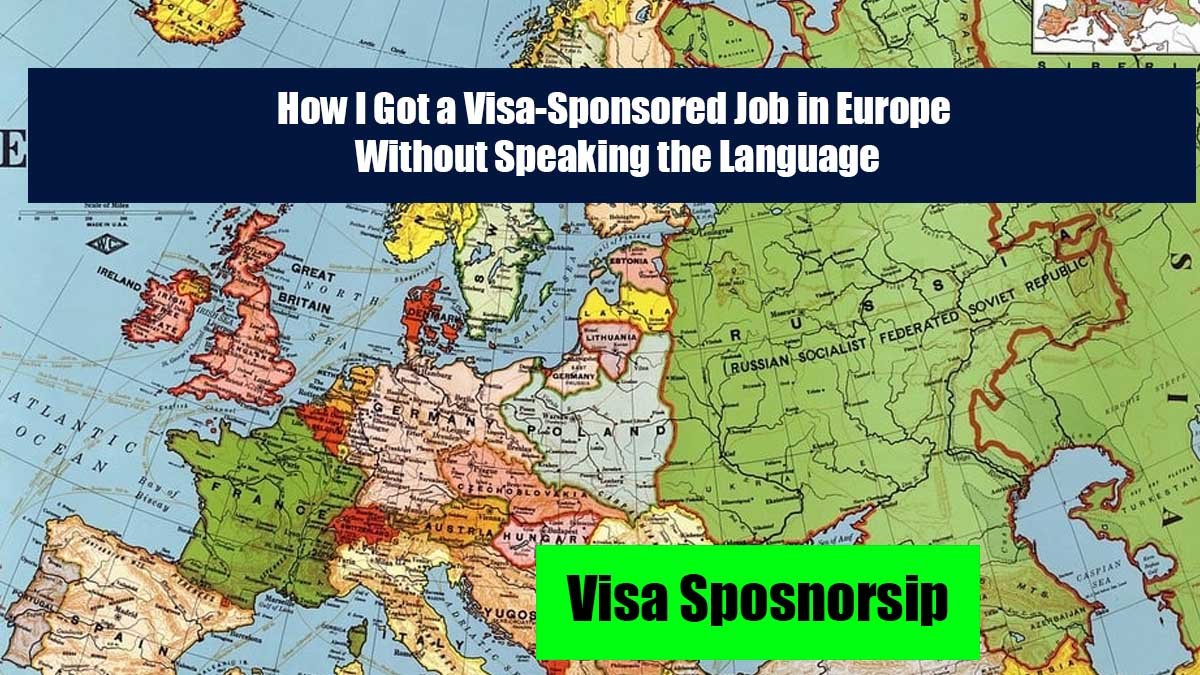When I first started dreaming about working in Europe, I thought it was impossible without speaking French, German, Spanish, or some other local language. Everyone told me, “Employers won’t hire you unless you’re fluent.” But in 2025, the job market is changing — and I’m living proof. I landed a visa-sponsored job in Europe without speaking the local language, and you can too.
Here’s my full story, along with practical tips that can help you do the same.
My Background Before Moving
I wasn’t a language expert, nor did I have a fancy university degree from Europe. I had work experience in hospitality and customer service from my home country, and I knew how to adapt quickly. That turned out to be more valuable than I thought.
Step 1 – Choosing the Right Country
Some countries in Europe are more open to hiring foreigners without language skills, especially if they have skill shortages. Countries like Luxembourg, Netherlands, Portugal, Ireland, and Germany have English-friendly work environments in certain industries.
I made a list of countries where English was widely spoken at work and where employers frequently offered visa sponsorship.
Step 2 – Targeting the Right Industries
Not every industry requires you to speak the local language fluently. I focused on roles where English is the main communication tool, such as:
- Hospitality & tourism (hotels, resorts, restaurants)
- IT and tech support
- International companies with English-speaking teams
- Farm and agricultural work
- Seasonal jobs like summer resorts or winter ski lodges
These industries often hire urgently and are open to non-native speakers.
Step 3 – Applying to Jobs That Offer Visa Sponsorship
I filtered job listings for those that mentioned “visa sponsorship available” or “relocation assistance provided.” I also targeted companies that had hired foreigners before, as they usually have the process figured out.
Tip: Job boards like EURES (European Job Mobility Portal) and LinkedIn make it easy to search for jobs with relocation benefits.
Step 4 – Focusing on My Skills, Not My Language Limitations
Instead of apologizing for not speaking the language, I highlighted my strengths — customer service, flexibility, and willingness to work in remote areas. Employers liked that I was ready to start quickly and adapt to their needs.
I also learned a few key phrases in the local language before the interview to show effort, even if I wasn’t fluent.
Related: New Visa Sponsorship Jobs in Canada
Step 5 – The Interview Process
During interviews, I focused on clear communication in English and used examples from my past jobs to show how I could handle challenges. Many European employers already work in international environments, so they appreciated my confidence and professionalism more than my grammar.
Step 6 – Getting the Visa Sponsorship
Once I got the job offer, my employer handled most of the visa paperwork. I provided necessary documents like my passport, police clearance, medical check, and proof of work experience. The process was faster than I expected — about six weeks from offer to visa approval.
Life After Moving
When I arrived, my employer provided temporary accommodation and even assigned a colleague to help me with things like grocery shopping and opening a bank account. I’ve started learning the language bit by bit, but my job still operates mostly in English.
Key Tips for Landing a Job Without the Language
- Pick English-friendly roles and countries with high demand for foreign workers
- Be open to remote or seasonal jobs — they’re easier to get into without language skills
- Highlight adaptability and soft skills during the hiring process
- Start learning the basics of the local language to show effort
- Target companies that have a history of hiring foreigners
Related: Top Countries Offering Visa Sponsorship Jobs in 2025
Final Thoughts
Getting a visa-sponsored job in Europe without speaking the language isn’t just possible — it’s happening every day. Employers need skilled, reliable workers, and in many cases, your work ethic matters more than your fluency.
If you’re ready to take the leap, start applying now. You might just find yourself boarding a plane to a new life sooner than you think.
